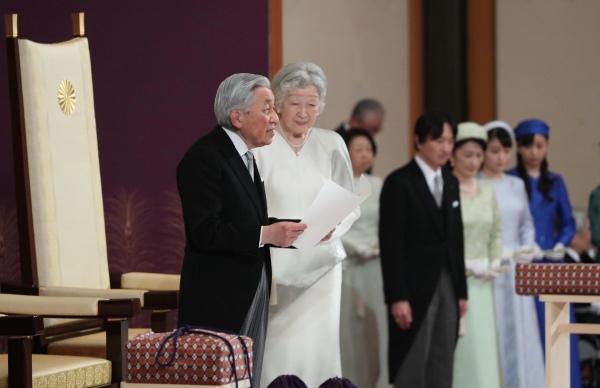London
Thomson Reuters Foundation
Japan’s emperor this week passes the Chrysanthemum Throne to his son Crown Prince Naruhito after his abdication on Tuesday.
The monarch’s decision to stand down has sparked discussion over whether the country’s male-only succession rules should be changed to allow women to inherit the throne.
Here’s a look at which countries allow their princesses to become queens in their own right and which have kept it a boys’ club.

Japan’s Emperor Akihito, flanked by Empress Michiko, delivers a speech during a ritual called Taiirei-Seiden-no-gi, a ceremony for the Emperor’s abdication, at the Imperial Palace in Tokyo, Japan, on 30th April, 2019. PICTURE: Japan Pool/Pool via REUTERS
• Bhutan allows male heirs to leapfrog over their younger sisters to take the throne under laws that also require the king to retire at age 65.
• Britain dropped rules that had for centuries given sons preference in inheriting the throne in 2011. However, the next three monarchs will all be men.
• Morocco only allows men to rule: according to the country’s constitution, the crown passes to the eldest son unless the reigning monarch names a younger son as his heir.
• In the Netherlands, the crown passes to the eldest child of the previous monarch. The country changed its rules in 1983 to give women an equal right to inherit the throne.
• Norway changed its laws in 1990 to allow the throne to pass to the eldest child, regardless of gender. However, it included a transition period where male royals born before 1990 still take precedence over their female relatives.
• Absolute monarchy Oman only allows male heirs to take on the role of sultan.
• Saudi Arabia has no clear line of inheritance, but the throne is only passed to men. The king and senior family members from each branch of the royal House of Saud decide which of hundreds of princes should be chosen to lead.
• Spain has a system of male preference, meaning a woman can inherit the throne but a younger son will take precedence over any elder sisters.
• Sweden in 1980 became the first modern monarchy to change its succession rites so that the first-born child of the monarch is heir to the throne, regardless of gender.
• Thailand’s constitution in 1974 changed the rules of succession to allow the possibility for women to inherit the throne.





